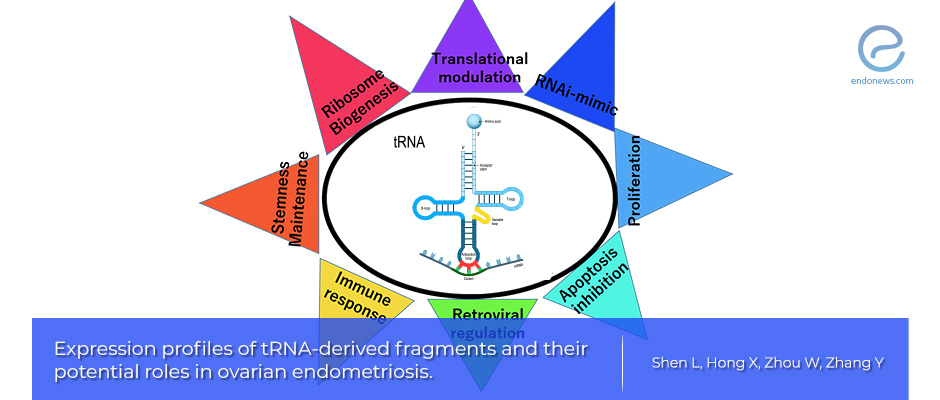tRNA-derived fragments in ovarian endometriosis?
Apr 27, 2020
Expression profiles of tRNA-derived fragments and their potential roles in ovarian endometriosis
Key Points
Highlight:
- Dr. Zhang group suggests that dysregulated tRNA-derived fragments could be involved in the pathogenesis and progression of endometriosis.
Background:
- Numerous studies have focused on the pathogenesis of endometriosis, but the exact mechanism of disease and progression remains unclear.
- Transfer RNA (tRNA) decodes mRNA for protein synthesis, and their aberrant expression is relevant to human diseases such as cancer, metabolic disorders, neurodegenerative diseases.
- The potential roles of tRNA fragments in endometriosis have not yet been analyzed.
Key points:
- A total of 24 tRNA fragments were differentially expressed in endometriosis.
- The most upregulated tRNA fragments are shown to related to transcriptional activation and RNA polymerase II DNA binding.
- One tRNA, namely "tDR-001292", is statistically different between ectopic and eutopic endometrium and is particularly responsible for signaling and cell communication.
Conclusions:
- This study provided the deviant expression profiles of tRNA fragments in ovarian endometriosis for the first time.
- Specific tRNA fragments could be a new class of regulatory molecules interacting with many genes and thus impacting the disease by the dynamics of signaling pathways.
Lay Summary
Endometriosis is an estrogen-dependent mysterious disorder characterized by the presence of endometrium outside the normal location of the uterus cavity. This disease affects approximately 10% of reproductive-aged women and becomes a major reason for infertility in reproductive-aged women and dysmenorrhea in teenage girls. Numerous studies have focused on the pathogenesis of endometriosis, but the exact mechanism of disease progressions still remains unclear. Therefore, it is essential to explore new key molecules that may play important roles in endometriosis.
Transfer RNA (tRNA) is well known for its important role in decoding mRNA in protein synthesis. The aberrant expression of tRNAs and tRNA fragments is reported to be relevant to human diseases such as cancer, metabolic disorders, and neurodegenerative diseases. However, the potential roles of tRNA fragments in endometriosis have not yet been analyzed.
Dr. Zhang group from China has investigated the expression profiles of tRNA fragments in endometriosis and analyzed their biological function. This paper was recently published in the journal “Epigenomics”.
A total of 24 tRNA fragments were differentially expressed in paired ectopic endometrium and eutopic endometrium samples, under the condition of more than two-fold changes. The most upregulated tRNA fragment is tDR-000894. This molecule primarily participates in the regulation of the RNA biosynthesis and transcriptional activation and RNA polymerase II DNA binding.
Another interesting tRNA fragment is tDR-001292, which is statistically different between ectopic and eutopic endometrium. It was usually found in integral and intrinsic components of the membrane and its molecular functions mainly included olfactory and signaling receptor activity. Pathway analysis showed that 17 pathways may be involved and the HIF-1 signaling pathway is one of them.
In conclusion, this study provided the deviant expression profiles of tRNA fragments in ovarian endometriosis for the first time. Based on this finding, Dr. Zhang suggests that specific tRNA fragments could be a new class of regulatory molecules interacting with many genes and thus impacting the endometriosis by the dynamics of signaling pathways.
Research Source: https://www.ncbi.nlm.nih.gov/pubmed/31845823/
AGO Ectopic endometrium Endometriosis Eutopic endometrium Noncoding RNAs Small RNA sequencing tiRNAs transfer RNA-derived fragments tRFs tRNA

